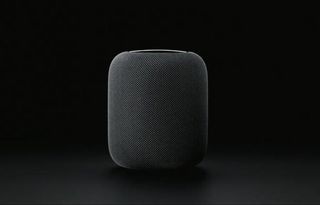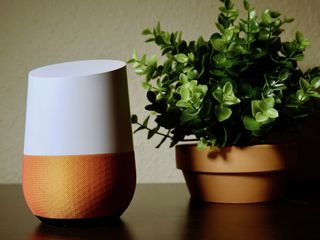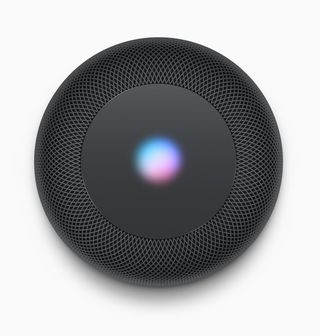Should you wait for Apple HomePod or buy a Google Home or Echo today?

Apple revealed its long-rumored, Wi-Fi-connected smart speaker at WWDC this year. The company is positioning the HomePod as the quintessential in-home listening device. It also comes with Siri — use the wake phrase, "Hey, Siri," and it can do anything Siri can do!
HomePod FAQ: Everything you need to know!
You can control your HomeKit-enabled accessories (even when you're away from home, since the device acts as a HomeKit Home Hub), listen to music and other content with the device's excellent speakers, set timers and reminders, check your calendar, send messages, and more.
It's a bit like Amazon's Echo devices, a bit like Google Home, and a bit like Sonos's line of wireless speakers. One huge difference between them, however, is the fact that you can buy an Amazon Echo, Google Home, or Sonos speaker right now — you'll have to wait until December if you want a HomePod. So should you? Here's what you need to know about HomePod, Google Home, and Amazon Echo to help you make the right smart-speaker purchase for you!
HomePod has more in common with Sonos wireless speakers than it does Amazon Echo and Google Home
HomePod is packed with some serious tech!
- 7 beam-forming tweeters
- 1 4-inch, Apple-designed woofer
- 6 microphones
- powered by Apple's A8 chip
Using what Apple calls "Spatial Awareness," its beam-forming tweeters and woofer work together to provide virtual surround sound in whatever space you're in. The HomePod will "scan" the room and adjust its tweeter/woofer system accordingly to provide the best possible sound.

The Amazon Echo has a single 2-inch tweeter and a single 2.5-inch woofer. It touts seven built-in, beam-forming microphones. The Echo's tweeter and woofer don't feature beam-forming technology. Google Home has a single 2-inch full range driver. It includes two beam-forming microphones. Google says it uses its machine learning and neural networks to better understand commands.
Master your iPhone in minutes
iMore offers spot-on advice and guidance from our team of experts, with decades of Apple device experience to lean on. Learn more with iMore!
Put simply, if an exceptional music-listening experience is priority one and "can control stuff with my voice" is priority two, you should wait until December. You're going to get better sound out of HomePod than you ever will out of Google Home or the Amazon Echo.

But! There's something else worth considering here: Amazon's Echo Dot (the smaller of its main Alexa-enabled devices) can be connected to any speaker system that's compatible with the 3.5mm headphone jack it's reppin'. If you already own great speakers or want to invest in some, you might find the Echo Dot to be right for you.
Are you subscribed to Apple Music? Do you have AirPlay-compatible devices?

Apple says, and I quote, HomePod is "built to bring out the best in Apple Music."
The smart speaker is heavily integrated with Apple Music. If you're not a subscriber, you're not going to get the best possible experience you can.
Here's a look at the three speakers' integrated music services:
- Google Home: Pandora, YouTube Music, Google Play Music, Spotify
- Amazon Echo: Amazon Music Unlimited, Spotify, Pandora, iHeartRadio, TuneIn
- HomePod: Apple Music
Say you're a devoted Spotify subscriber who wants a HomePod. You can still use HomePod to play music from Spotify. HomePod supports AirPlay 2, Apple's wireless streaming protocol. You can connect and stream to one or several HomePods throughout your home for whole-home audio listening given your app of choice adds support. One thing to keep in mind is — as it stands — you're not going to get nuanced voice control over anything but Apple Music if you go with HomePod. You won't be able to ask Siri on your HomePod to play specific Spotify albums or start a Pandora station — Apple doesn't offer those integrations.
Google Home and Amazon Echo offer more nuanced voice control for the aforementioned integrated music services. As far as streaming methods, here's how the speakers stack up:
- Google Home: Chromecast streaming in supported apps (with Bluetooth streaming coming soon) and on-device Wi-Fi streaming
- Amazon Echo: Bluetooth streaming and on-device Wi-Fi streaming
- HomePod: On-device streaming of Apple Music and AirPlay 2 audio streaming from supported devices (like iPhone and iPad).
If you're all-in on Apple Music (or you're comfortable going all-in at some point) and want to control your listening sessions with your voice, waiting for HomePod's a no brainer. If you'd rather keep your music-streaming and voice-control options open (and like the idea of Bluetooth and Chromecast streaming), you should probably snag a Google Home or Amazon Echo now.
HomePod is a Siri vessel. Google Home is a Google Assistant vessel. Amazon Echo is an Alexa vessel.

You can expect full Siri support on HomePod. The speaker — like in-home iPads and Apple TVs — acts as a Home hub and will let you control your HomeKit-enabled lights and accessories.
It's certainly worth noting the HomePod is only going to control HomeKit-enabled accessories; if you've got accessories that are missing that "Works with Apple HomeKit" badge, you'll need a different smart assistant.
Amazon Echo and Google Home are regularly neck-and-neck when it comes to smart home integrations. Amazon's Alexa and the Google Assistant can power a whole swath of connected home products.
Both the Echo and Home offer something called proactivity, too. Amazon Echo can send you ambient notifications by lighting up the LED ring atop its casing and Google Home can do the same with a quick flicker of its four LED lights. You'll get notifications of delayed flights, reminders, upcoming appointments, particularly hairy traffic, and more. Apple made no mention of proactive features for HomePod at WWDC, but the company could announced new features when the device ships in December.
If you want a proactive home assistant or want to be able to control your home now instead of later, Google Home or Amazon Echo are the obvious choice. If you're rockin' a HomeKit-enabled home and don't mind waiting for an always-on, always-ready Siri command center, wait for HomePod.
Is price a factor?
HomePod is more expensive than both the Google Home and Amazon Echo. If you want to spend less and have a smart speaker now, don't wait for the HomePod. If you're OK with spending more and getting that full, rich sound from HomePod, wait until December.
- Google Home: $129.99
- Amazon Echo: $179.99
- Amazon Echo Dot: $49.99
- Amazon Echo Show: $229.99
- Apple HomePod: $349
Bottom line
HomePod is worth the wait if you're big into deliciously decadent audio, in-home Siri, and the best possible Apple Music experience. Google Home or Amazon Echo are better if you need (or want) a smart assistant now, want to keep your music streaming and audio listening options open, and don't mind sacrificing a premium listening experience.
You can check out our other guides for more info on HomePod and how it stacks up against Google Home, Amazon Echo, and Sonos:
- HomePod vs. Google Home vs. Amazon Echo: What's the difference?
- HomePod vs. Sonos: What's the difference?
So which smart speaker will you be getting? Did we help you reach your decision? Share your thoughts on Twitter or in the comments below!

○ Everything about WWDC 2020
○ WWDC 2020 remote lineup
○ Download the Apple Developer app
○ iOS/iPadOS 14
○ macOS 10.16
○ watchOS 7
○ tvOS 14
○ Discussion forums
Mikah Sargent is Senior Editor at Mobile Nations. When he's not bothering his chihuahuas, Mikah spends entirely too much time and money on HomeKit products. You can follow him on Twitter at @mikahsargent if you're so inclined.
Most Popular






